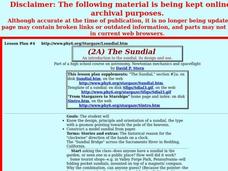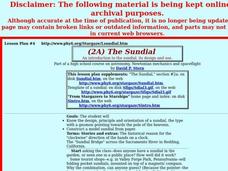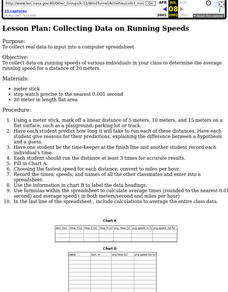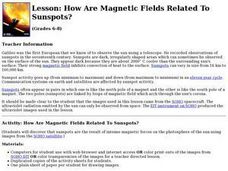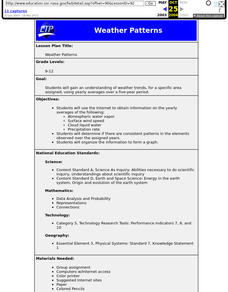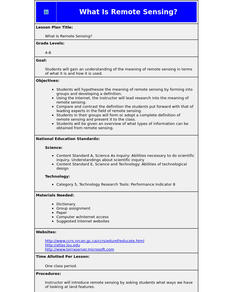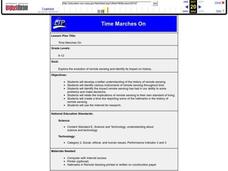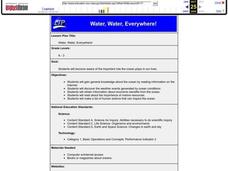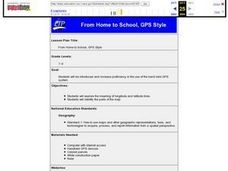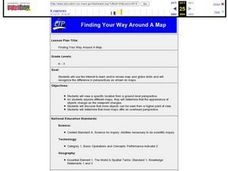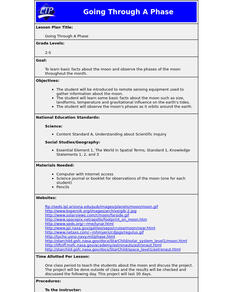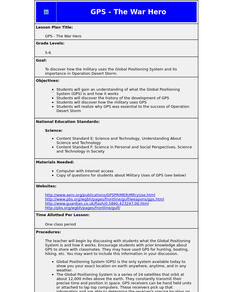Curated OER
Observing Bursts from an X-ray Burster
Learners study the use of X-ray data to make size and energy estimates of the source and the processes occurring there. They use XTE observations of the object GRO 1744-28 to determine whether bursts occur periodically and the duration...
Curated OER
Aerology- The Study of Mars
Students investigate various aspects of the planet Mars. They examine a core sample that is simulated to make observations. Then compare the known sample with one that is unknown and differentiate between the two. Students hypothesize...
Curated OER
Timing An X-ray Pulsar
Students use X-ray data to identify an object as a rotating neutron star, and determine its period of rotation. They use XTE observations of the Crab Pulsar to determine the period of the light intensity, interpret this period as the...
Curated OER
Human Factors
Students explain the psychological effects of living in space. They esign the houses and interior of a space settlement, make decisions about the running of a space settlement, and explore the human factors involved in space colonization.
Curated OER
Stargazers and Skywatchers
High schoolers are introduced to the apparent motion of the Sun across the sky and the way it changes in summer and winter.
Curated OER
Airplane flight
High schoolers learn the basic concepts about airplane flight. They learn the reason jetliner wings are swept back and why jet engines have replaced propellers in high-speed flight.
Curated OER
Changes Inside Planets
Pupils investigate the concept of planetary differentiation. They complete an experiment to simulate it using gelatin and food. The lesson includes vocabulary to increase reading comprehension skills as part of the inquiry. The lesson...
Curated OER
Make a Comet Model and Eat It!
Students create models of comets. They develop a comet model in a team and exchange samples with other teams. They use their senses to demonstrate the filters on a spectrometer and record their data. They discuss the contents of their...
Curated OER
Human Factors
Students design a space settlement for colonizing a planet in our solar system. In small groups, they play a space colony game and read an article about human needs in space to prepare for the design stage. They discuss their design...
Curated OER
Air is something
Students recognize that air has the properties of mass and volume. They predict, observe, and evaluate the effect of the air on various objects, using bubbles and bubble wands.
Curated OER
Air can do work.
Students replicate the teacher demonstrations by changing the variables and predicting the outcomes.
Curated OER
Collecting Data on Running Speeds
Students collect data on running speeds of various individuals in class to determine the average running speed for a distance of 20 meters.
Curated OER
How Are Magnetic Fields Related To Sunspots?
Middle schoolers discover that sunspots are the result of intense magnetic forces on the photosphere of the sun by observing images from the SOHO satellite.
Curated OER
Weather Patterns
Students use yearly averages over a five-year period to understand weather trends for a specific area.
Curated OER
What is Remote Sensing?
Students learn about remote sensing in terms of what it is and how it is used.
Curated OER
Time Marches On
Students research the development of remote sensing, various instruments used throughout time and create a time line depicting the history of remote sensing.
Curated OER
Water, Water, Everywhere!
Students become aware of the important role the ocean plays in our lives. Students will gain general knowledge about the ocean by reading information on the Internet. They discover the weather events generated by ocean conditions.
Curated OER
From Home to School, GPS Style
Students are introduced and increase proficiency in the use of the hand held GPS system. They explore the meaning of longitude and latitude lines, then identify the parts of the map.
Curated OER
Finding Your Way Around A Map
Students use the Internet to learn and/or review map and globe skills and will recognize the difference in perspectives as shown on maps.
Curated OER
Going to Extremes
Students recognize that our ability to explore the extremes of the ocean is directly related to the technology of remote sensing. Students will recognize the deep submergence vehicle, Alvin, and the advanced sensors on board as tools for...
Curated OER
Going Through A Phase
Students are introduced to remote sensing equipment used to gather information about the moon. They learn basic facts about the moon such as size, landforms, temperature and gravitational influence on the earth's tides.
Curated OER
GPS - The War Hero
Learners understand what the Global Positioning System (GPS) is and how it works. They discover the history of the development of GPS and how the military uses GPS. They realize why GPS was essential to the success of Operation Desert...







